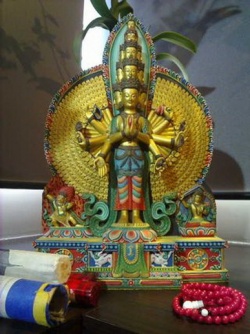Perceiver of the World's Sounds
Perceiver of the World's Sounds
観世音菩薩 (Skt Avalokitasvara or Avalokiteshvara; Jpn Kanzeon-bosatsu)
Also known as Perceiver of Sounds. Widely known by his Chinese name Kuan-yin (Perceiver of Sounds),
he is one of the most popular bodhisattvas in the Buddhist world and revered as the bodhisattva of infinite compassion.
The bodhisattva is the protagonist of the "Perceiver of the World's Sounds" (twenty-fifth) chapter of the Lotus Sutra, which is also known as an independent sutra.
According to that chapter, this bodhisattva is called Perceiver of the World's Sounds because he perceives the sounds and voices of those who are suffering and compassionately releases them from that suffering.
He assumes various forms and appears wherever is necessary to save people from danger or fear.
In the chapter, Shakyamuni Buddha says: "Suppose there are immeasurable hundreds, thousands, ten thousands, millions of living beings who are undergoing various trials and suffering.
If they hear of this bodhisattva Perceiver of the World's Sounds and single mindedly call his name, then at once he will perceive the sound of their voices and they will all gain deliverance from their trials."
The chapter lists specifically thirty-three among the variety of different forms Bodhisattva Perceiver of the World's Sounds assumes in accordance with people's needs to relieve their suffering;
it also states that he is called Bestower of Fearlessness because he liberates people from fear and gives them security.
The chapter states, "This bodhisattva and mahasattva Perceiver of the World's Sounds can bestow fearlessness on those who are in fearful, pressing, or difficult circumstances.
That is why in this saha world everyone calls him Bestower of Fearlessness."
In the Buddha Infinite Life Sutra and the Meditation on the Buddha Infinite Life Sutra, Perceiver of the World's Sounds appears with Bodhisattva Great Power as an attendant of Amida Buddha.
In Esoteric Buddhism, he is one of the nine honored ones in the central court of the Womb Realm mandala.
Because he was said to assume various forms, he is depicted in a number of ways. Several esoteric sutras refer to different forms of this bodhisattva, such as an eleven-faced Perceiver of the World's Sounds and a thousand-armed Perceiver of the World's Sounds.
The bodhisattva was generally regarded as male, but in China, apparently as early as the seventh century, Perceiver of the World's Sounds came to be thought of as female.
Among other powers, the bodhisattva was said to protect women during childbirth.
Popular worship of this bodhisattva began in India and became widespread in China, Japan, and other countries.
Perceiver of the World's Sounds is also known by the name Freely Perceiving ( Jpn Kanjizai), which is a rendering of Hsüan-tsang's (602-664) Chinese translation of the Sanskrit name Avalokiteshvara.
The name of Perceiver of the World's Sounds derives from Kumarajiva's Chinese translation of Avalokitasvara.
Avalokiteshvara is a compound of avalokita, meaning the act of looking or "having been seen," and ishvara, meaning "able to do," "master," or "lord."
Avalokitasvara is a compound of avalo-kita and svara; svara means sound and voice.
It is generally believed that Avalokitasvara came into use before Avalokiteshvara, and in the history of Chinese translations of Buddhist scriptures, "Perceiver of the World's Sounds" preceded "Freely Perceiving."
Kumarajiva used the former in his translation of the Lotus Sutra.
In China and Japan, this chapter of Kumarajiva's translation circulated as an independent sutra titled Perceiver of the World's Sounds Sutra.
It is perhaps for these reasons that the name Perceiver of the World's Sounds is so popular today.
Many Chinese refer to this bodhisattva as Kuan-yin ( Jpn Kannon), an abbreviation of Kuan-shih-yin (Kanzeon).
Source
